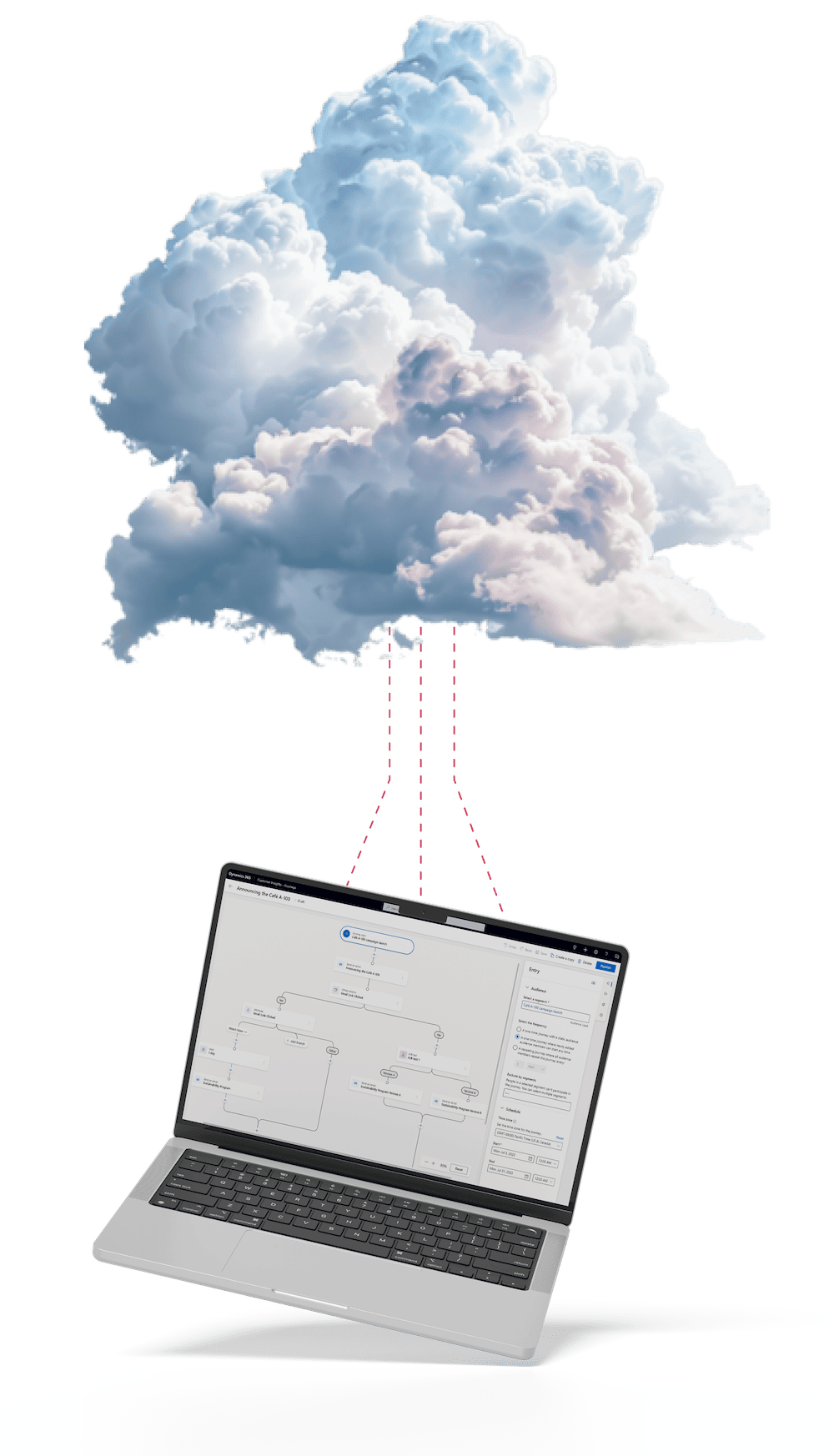Why moving to the cloud is essential
Modernizing their technology infrastructure has become critical for international companies using older versions of Microsoft Dynamics ERP as international organizations expand and adapt to global markets. Companies running older versions of Microsoft Dynamics ERP face unique challenges that can be effectively addressed by moving to the cloud.

Seamless transition to the cloud
As businesses grow and expand globally, traditional on-premises solutions can limit scalability, performance, and integration capabilities. Moving to the cloud can help position your business for global success:
- Scalability: Easily expand your operations without needing significant capital investments in IT infrastructure.
- Global integration: Connect with other Microsoft products, such as Office 365, Power Platform, and third-party applications, enhancing cross-border operations.
- Security & compliance: Benefit from Microsoft's industry-leading security and compliance standards, which are critical for international businesses with diverse regulations.
- Cost efficiency: Reduce your IT spending by eliminating the need for on-prem hardware and costly maintenance.
- Futureproofing: Ensure your business is always current with Microsoft's latest features and updates, positioning you to stay ahead in the market.
Benefits of moving to the cloud for international companies
Cost-efficient deployment
Migrating to a cloud-based ERP system can significantly reduce operational costs. On-premises systems require expensive hardware, physical server maintenance, and substantial energy consumption.
In contrast, cloud ERP eliminates the need for these expenses. Cloud solutions operate on a subscription-based model, making budgeting more predictable and reducing the total cost of ownership. IT departments can also redirect resources from routine system maintenance to strategic initiatives, driving more excellent organizational value.
Automatic updates and continuous innovation
With cloud ERP, organizations no longer need to worry about time-consuming updates and patches. Cloud-based systems, like Microsoft Dynamics 365, receive automatic biannual updates, ensuring that your organization always has access to the latest features and functionalities.
This continuous innovation helps your company stay competitive in an ever-evolving marketplace.
Scalability and agility
International companies require a flexible and scalable system that grows with their business needs. Cloud ERP provides just that. As your business expands or experiences seasonal fluctuations, cloud solutions allow for easy scaling—whether adding users, applications, or processing power.
You pay only for what you use, making it cost-effective to meet changing demands without heavy upfront investments.
Global accessibility
For global teams, accessibility is paramount. Cloud-based ERP systems allow employees to access data and applications from any location, on any device, via a secure web browser.
This empowers international teams to collaborate seamlessly and respond to real-time customer needs, improving productivity and customer service.
Enhanced security
Data security is a top concern for any international business. Cloud ERP platforms offer advanced security features, particularly from trusted vendors like Microsoft. Your data is safeguarded with enterprise-grade encryption, automatic backups, and continuous monitoring.
However, ensuring that your internal access controls are aligned with best practices is crucial. Users should have access only to the data and applications relevant to their roles, supported by regular security training.
Actionable insights for improved decision-making
One of the most valuable benefits of migrating to the cloud is access to advanced data analytics and artificial intelligence. With cloud ERP, international companies can harness big data, AI, and IoT to drive informed business decisions.
Automated insights and real-time data allow teams to collaborate more efficiently, while executives can quickly adapt strategies based on up-to-the-minute information.

Preparing for Cloud Migration
Before migrating to the cloud, it is essential to have a well-structured plan in place. Here's what you should consider:
- Data preparation and management: Transitioning to the cloud requires careful planning around data migration. You should determine which data is actively used and what historical data must be archived or transformed. Data stored in older on-premises systems may need to be reformatted to fit cloud-based workflows. Prioritize less critical data for the initial move to ensure ongoing business processes are maintained.
- Choosing the right migration strategy: Several methods exist for migrating data, including physical shipment, network transfers, or a hybrid approach. Selecting the right strategy depends on your organization's specific needs. Once the data is transferred, you must verify it has been accurately migrated.
- Automation and efficiency: By carefully planning your migration, you can automate specific processes, improving the data flow and ensuring fewer modifications are needed for tasks like statistical analysis. Automation also paves the way for more efficient business intelligence, offering actionable insights to guide your company toward better decision-making.

Upgrade with confidence
Pipol can make your transition smooth and strategic with our Microsoft Dynamics 365 Roadmap to Cloud Service.
For international businesses, transitioning to a cloud-based ERP is more than just an upgrade—it's an opportunity to unlock new levels of efficiency, scalability, and global collaboration.
At Pipol, we understand that a successful upgrade requires meticulous planning and execution. Our Dynamics 365 Roadmap to Cloud Service is designed to provide a clear, customized path to the cloud, minimizing disruption while maximizing your business's benefits.<X

5 steps to success
- Customized assessment: We thoroughly evaluate your current systems, processes, and objectives. This ensures we tailor a cloud roadmap that addresses your unique challenges and aligns with your global business goals.
- Strategic planning: With your customized roadmap, we develop a strategic upgrade plan. This includes clear timelines, resource planning, and detailed milestones to ensure a smooth and predictable transition, whether upgrading from an older NAV version or an on-prem Dynamics 365 system.
- Expert implementation support: Our team of Dynamics 365 specialists provides hands-on support through every upgrade process step. From seamless data migration to optimized system configuration, we ensure minimal downtime and disruptions to your international operations.
- Empower your team: We provide comprehensive training and ongoing support to ensure your global teams are fully equipped to use Dynamics 365's enhanced features and integrations.
- Continuous improvement: Pipol offers ongoing services to ensure your cloud solution evolves with your business. As your operations grow, we help you optimize and expand your Dynamics 365 solution to meet changing demands.

Is now the right time?
If your business is still operating on older versions of NAV, AX, or Dynamics 365 on-prem, it is time to upgrade to the cloud. With Microsoft's clear direction towards cloud-first innovations, moving to the cloud will ensure your system remains aligned with future updates and capabilities.
You will benefit from:
Improved cybersecurity
Enhanced protection and compliance for your global data.
Faster performance
Take advantage of Microsoft’s powerful cloud infrastructure for improved speed and efficiency.
Seamless integrations
Streamline your workflows with integrations across Microsoft 365, Power Platform, and more.
Cloud vs. on-premises vs. hybrid
At Pipol, we work closely with international organizations to assess their needs, ensuring that they choose the right solution and that it is implemented effectively.
Some organizations may not be ready for a full cloud migration but may benefit from a hybrid approach and others again may benefit from just updating their on-premises legacy systems.
Get in touch
Send us an email
Let us know what your challenges are all about. We are here to help.
